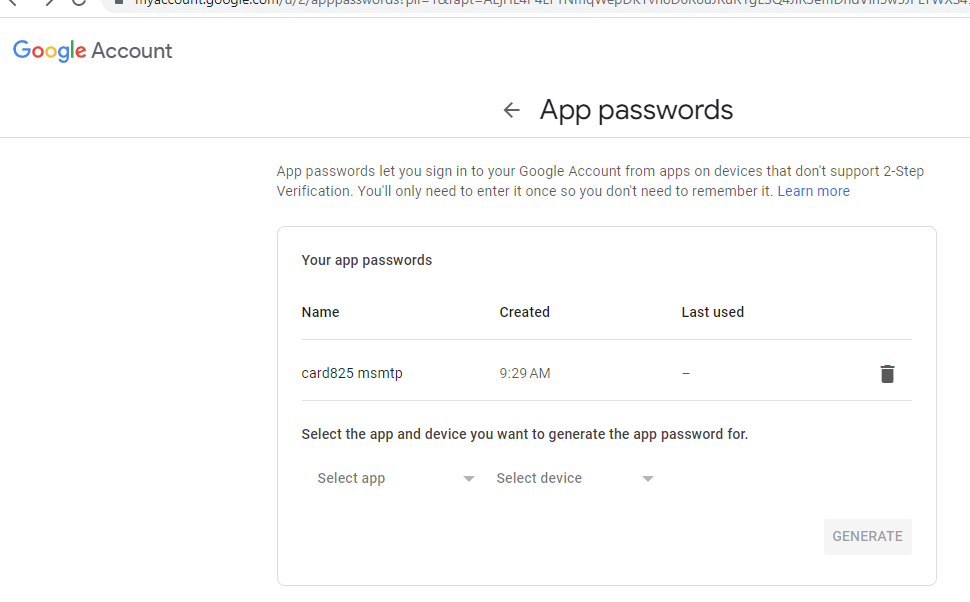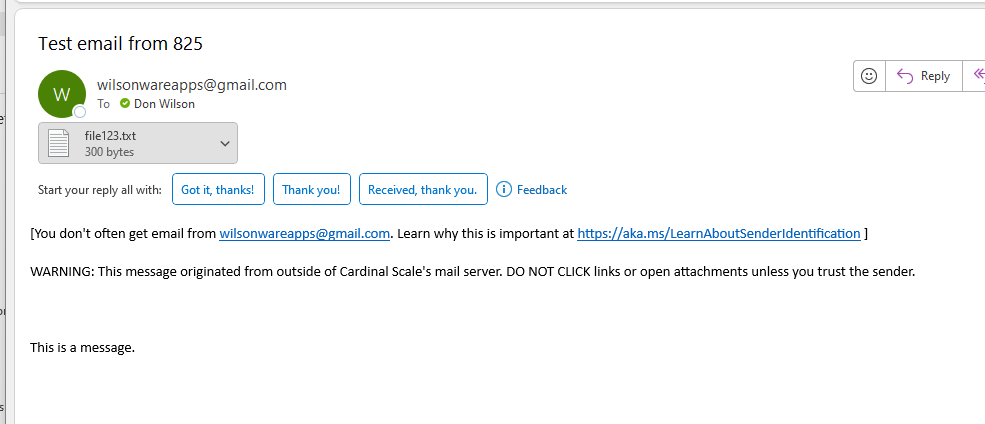Sending Email
The 825 Gen2 can send emails.
The sendmail and msmtp commands are included in the 825 Gen2 Linux operating system.
Create the msmtp config file
nano ~/.msmtprc
Type the email account information such as:
defaults tls on account gmail auth on host smtp.gmail.com port 587 user mygoogleaccount@gmail.com from mygoogleaccount@gmail.com account default : gmail
Save the configuration file.
Google no longer allows applications to use regular Google login password. To send email using a Google account create an app specific password in the Google web portal for the account to be used.
Keep a record of the generated password
ueut jrqv eapo eaid
Create an email as a text file.
nano message.txt
Type the email such as:
From: mygoogleaccount@gmail.com To: someone@destination.com Subject: Test email from 825 Test 825ARM Variscite 123456 abc
Send the email
msmtp -t < message.txt password for mygoogleaccount@gmail.com at smtp.gmail.com:
Enter the app password. Email was sent successfully.
How to store password to not require password entry every time email is sent?
Password can be added to config file such as:
nano ~/.msmtprc
Add the password line with the previously obtained app specific password from Google.
defaults tls on account gmail auth on host smtp.gmail.com port 587 user mygoogleaccount@gmail.com from mygoogleaccount@gmail.com password ueut jrqv eapo eaid account default : gmail
Do the send again:
root@imx8mq-var-dart:~# msmtp -t < message.txt
The Email sent successfully with no prompt for password.
This could be done from app code using a system call.
How to send file attachments?
msmtp does not have support for file attachments directly. The message must be encoded into mime format.
Update message.txt to add MIME encoding
nano message.txt
From: mygoogleaccount@gmail.com To: someone@destination.com Subject: Test email from 825 MIME-Version: 1.0 Content-Type: multipart/mixed; boundary="MyBoundaryString" --MyBoundaryString Content-Type: text/plain Content-Transfer-Encoding: 7bit This is a message. --MyBoundaryString Content-Type: text/plain; file="file123.txt" Content-Disposition: attachment; filename="file123.txt" Content-Transfer-Encoding: base64
Create attachment file
nano attachment.txt
This is an attachment 123456 abcdefg
Use base64 to convert the attachment to base64 encoding:
base64 attachment.txt > /tmp/attachment
Now pipe both files to the msmtp command
cat message.txt /tmp/attachment | msmtp -t
This successfully sends email with attachment
To send an image attachment modify the message.txt
From: mygoogleaccount@gmail.com To: someone@destination.com Subject: Test email from 825 MIME-Version: 1.0 Content-Type: multipart/mixed; boundary="MyBoundaryString" --MyBoundaryString Content-Type: text/plain Content-Transfer-Encoding: 7bit Test 12345 ABCD --MyBoundaryString Content-Type: image/jpeg Content-ID: <image11> Content-Transfer-Encoding: base64
Note that there has to be a blank line at the end of the file
Encode the jpeg image into base64 such as:
base64 /usr/share/apache2/default-site/htdocs/images/v000011_1.jpg /tmp/attachment
Send the email.
cat message.txt /tmp/attachment | msmtp -t
Example of sending an email from an app:
void TestSendEmail(const char* from, const char* to, const char* subject) { FILE* file = fopen("/tmp/emailmsg.txt", "w"); if(file != NULL) { fprintf(file, "From: %s\n", from); fprintf(file, "To: %s\n", to); fprintf(file, "Subject: %s\n", subject); fprintf(file, "MIME-Version: 1.0\n"); fprintf(file, "Content-Type: multipart/mixed; boundary=\"MyBoundaryString\""); fprintf(file, "\n"); fprintf(file, "\n"); fprintf(file, "--MyBoundaryString\n"); fprintf(file, "Content-Type: text/plain\n"); fprintf(file, "Content-Transfer-Encoding: 7bit\n"); fprintf(file, "\n"); fprintf(file, "\n"); fprintf(file, "Transaction %d\n", tran.tktNum); fprintf(file, "\n"); fprintf(file, "Out: %s %s\n", tran.date.c_str(), tran.time.c_str()); fprintf(file, "In: %s %s\n", tran.inDate.c_str(), tran.inTime.c_str()); fprintf(file, "\n"); fprintf(file, "Truck: %s\n", tran.id[DB_TRUCK].c_str()); fprintf(file, "Product: %s\n", tran.id[DB_PROD].c_str()); fprintf(file, "Customer: %s\n", tran.id[DB_CUST].c_str()); fprintf(file, "Job: %s\n", tran.id[DB_JOB].c_str()); fprintf(file, "\n"); fprintf(file, "Gross: %s\n", tran.gross.c_str()); fprintf(file, "Tare: %s\n", tran.tare.c_str()); fprintf(file, "Net: %s\n", tran.net.c_str()); fprintf(file, "\n"); fprintf(file, "--MyBoundaryString\n"); fprintf(file, "Content-Type: image/jpeg\n"); fprintf(file, "Content-ID: <image11>\n"); fprintf(file, "Content-Transfer-Encoding: base64\n"); fprintf(file, "\n"); fclose(file); // Convert second pass image into base64 char tmp[128]; sprintf_s(tmp, "/usr/share/apache2/default-site/htdocs/images/v%06d_1.jpg", tran.tktNum); if(base64_file_encode(tmp, "/tmp/attachment") <= 0) { DEBUG_MSG("Error encoding jpg into base64 [%s]\n", tmp); } else { // Send it if(system("cat /tmp/emailmsg.txt /tmp/attachment | msmtp -t") != 0) { DEBUG_MSG("Error sending\n"); } } } }
When transaction is completed app can call this function such as:
char msg[80]; sprintf_s(msg, "ID Storage transaction %d", tran.tktNum); TestSendEmail("myaccount@gmail.com", "someone@gmail.com", msg);
We may create or find a library to generate mime encoded emails with html formatting and more features.
Attachments (2)
- google_app_password.png (42.8 KB ) - added by 2 years ago.
- 825test_email.png (25.6 KB ) - added by 2 years ago.
Download all attachments as: .zip
![(please configure the [header_logo] section in trac.ini)](/chrome/site/cardinal.gif)

